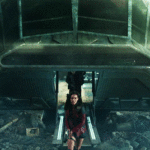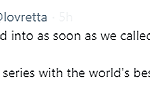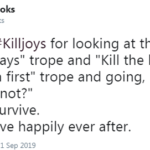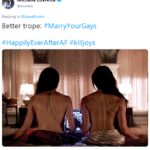[Michelle] Lovretta says Full Stop there was never any other option than to have a happy ending. “It was extremely important. I was determined to end with joy and I think that a large chunk of the recipe in anything that I write is hope. It is hope. It is kindness, it is joy. There may be monsters around you and there may be occasional crime and murder, and there’s going to be a lot of dick jokes, but there’s always got to be heart because I’m not in this for the grim and the gloom and the masturbatory rage,” she explains.
“There’s rage in the real world and I can’t write it. I can process rage, I can process trauma like a fucking champion. I can do that shit, but I can’t dwell in it. I can’t have a world be full of desperation and despair and cruelty. I don’t want to spend time there and so I’m never going to give that to you. If that is the metric by which I write, then it sort of presupposes that I need to end in a place that lives up to that.”
I’m a person who loves tropes and I love sort of spinning them and [there was a trope that I wanted] to spin on its ear. There’s always a feeling that for a story to have a mythic power —for us to feel that it mattered and that the people mattered — well, then they have to die, because life and death is that important. But if death is all that is important, then I think you’re selling life pretty damn short, and I don’t want to do that. Right now, given the state the world is in, I don’t want to be part of that negativity.
I believe in these characters. I love the journey they’ve been on. I’ve loved watching the villains become quasi-anti-heroes and the heroes be challenged. And I don’t see why they have to die just because a lot of conventions within storytelling tell us that we need death to feel that there’s weight. The weight on this show has always been about love, and it’s always been about hope and family and those things shouldn’t have to end.
Michelle Lovretta (Killjoys creator and executive producer)
(via banrions)






